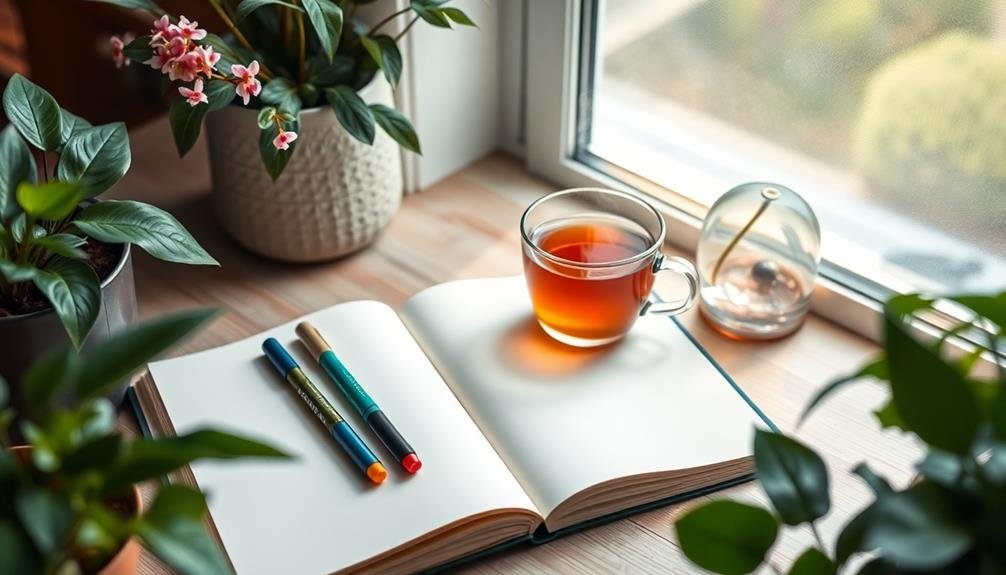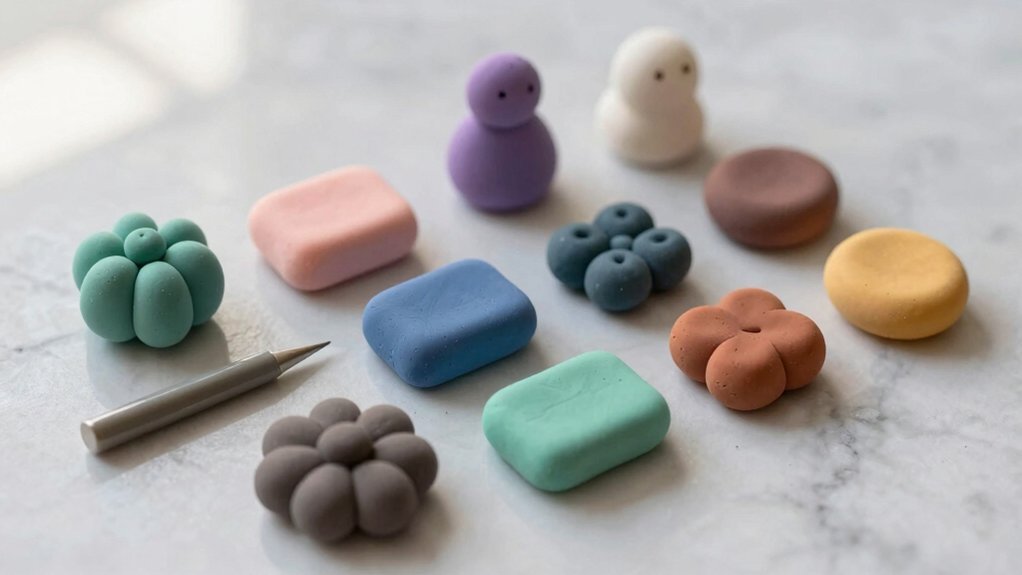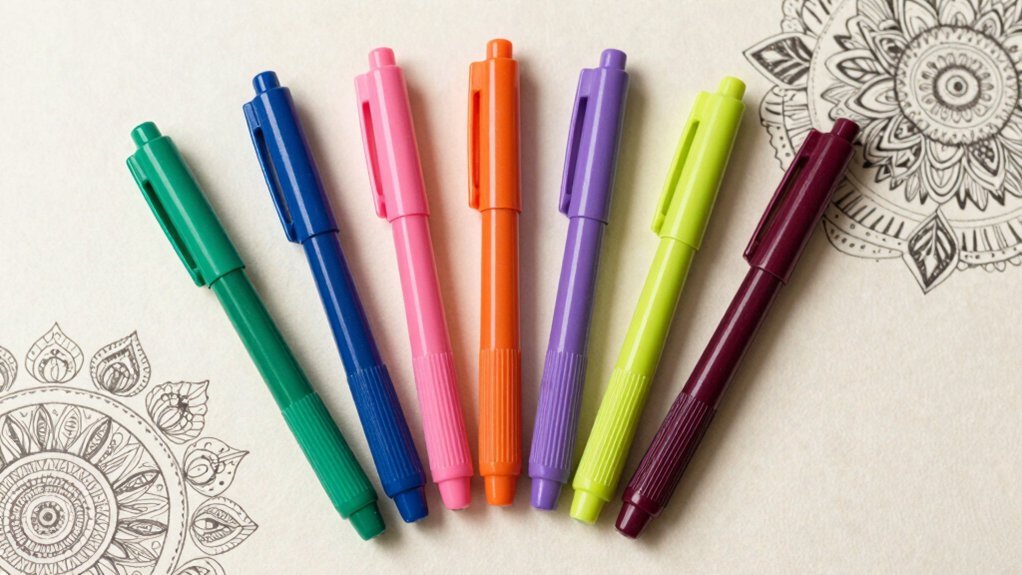Journaling is a powerful tool to combat anxiety, turning overwhelming feelings into manageable insights. Start by setting aside a regular time in a cozy space for reflection. Use prompts like, "What's causing my anxiety right now?" to identify sources or "What positive affirmations can I remind myself of?" to shift your perspective. Write freely; there's no need for perfection. As you explore your thoughts, you'll uncover patterns and triggers, helping you craft effective coping strategies. Embrace this journey to emotional clarity and release negative feelings—there's so much more waiting to enhance your practice.
Understanding Anxiety and Journaling

Many people often find themselves grappling with anxiety, feeling overwhelmed by racing thoughts and persistent worries. You might notice these feelings creeping in during stressful situations or even when you're trying to relax.
Anxiety can manifest in physical symptoms too—like a racing heart or tightness in your chest—making it hard to focus on anything else. It's important to recognize that you're not alone in this struggle.
One effective way to tackle anxiety is through journaling. When you put pen to paper, you create a safe space to explore your thoughts and feelings. This process helps you clarify what's bothering you, making it easier to understand the roots of your anxiety.
Instead of letting your mind spiral, you can channel those racing thoughts into written words.
Additionally, journaling allows you to track your emotions over time. By observing patterns in your anxiety, you can identify triggers and develop strategies to cope.
Benefits of Journaling for Anxiety
The transformative power of journaling can greatly alleviate anxiety. When you put pen to paper, you create a safe space to express your thoughts and feelings. This act of writing helps you process emotions, making overwhelming situations feel more manageable. By clarifying your worries, you gain perspective and can identify patterns that contribute to your anxiety.
Journaling also fosters self-reflection, allowing you to explore the root causes of your anxiety. As you investigate your thoughts, you may uncover triggers and develop strategies to cope with them. Additionally, the practice encourages mindfulness, keeping you grounded in the present moment and reducing feelings of worry about the future.
Moreover, journaling serves as an emotional release. When you articulate your fears and frustrations, you can lessen their intensity. This cathartic experience not only lightens your mental load but can also improve your mood.
Ultimately, journaling empowers you to take control of your anxiety. By documenting your journey, you'll notice progress over time, reinforcing a positive mindset. Embrace this powerful tool, and watch it transform your relationship with anxiety.
Effective Journaling Techniques

To make the most of your journaling practice, employing effective techniques can greatly enhance its benefits for anxiety relief. Start by setting a regular time for journaling, making it a part of your daily routine. Consistency helps you create a safe space for your thoughts and feelings.
Next, choose a quiet and comfortable environment where you can focus without distractions. This will allow you to explore deeper into your emotions. Use a specific format that resonates with you, whether it's free writing, bullet points, or structured entries.
Incorporate sensory details to ground yourself in the moment. Describe how you're feeling physically, emotionally, and mentally. This can help you process your anxiety more effectively.
Don't hesitate to express your thoughts honestly; your journal is your private sanctuary, free from judgment.
Lastly, consider reflecting on your entries periodically. This can help you identify patterns in your anxiety and track your progress over time. By using these techniques, you'll turn journaling into a powerful tool for managing anxiety, fostering self-awareness, and promoting emotional healing.
Prompts to Alleviate Anxiety
When you're feeling overwhelmed by anxiety, using targeted journaling prompts can provide a much-needed release and clarity.
Start by asking yourself, "What's causing my anxiety right now?" Write down your thoughts without judgment. This helps you pinpoint the source of your feelings.
Next, try the prompt, "What would I tell a friend facing the same anxiety?" This can shift your perspective and offer a compassionate view on your situation. You might realize that you're being too hard on yourself.
Another helpful prompt is, "What's one small step I can take today to feel better?" This encourages action, no matter how minor, and can help reduce feelings of helplessness.
Additionally, use the prompt, "What positive affirmations can I remind myself of?" Listing affirmations allows you to counter negative thoughts and foster self-acceptance.
Creating Your Journaling Routine

Establishing a journaling routine can considerably enhance your mental well-being. To get started, choose a specific time each day when you can dedicate a few minutes to writing. It could be in the morning to set a positive tone or at night to reflect on your day. Consistency is key, so pick a time that fits comfortably into your schedule.
Next, create a cozy space that invites you to write. Whether it's a quiet corner of your room or a favorite café, having a designated spot can help signal to your brain that it's time to journal. Gather your materials—whether it's a simple notebook or a digital app—and keep them easily accessible.
As you begin, don't worry about making it perfect. Focus on expressing your thoughts and feelings authentically. Start with a prompt that resonates with you, and let your words flow.
If you miss a day, don't stress—it's about progress, not perfection. Over time, you'll find that this routine not only helps you process anxiety but also fosters a deeper understanding of yourself.
Embrace the journey and enjoy the benefits of your journaling practice!
Frequently Asked Questions
What Materials Do I Need for Effective Journaling?
To journal effectively, you'll need a notebook or journal, a pen or pencil, and a quiet space. Consider adding colored pens or markers for creativity, and maybe some calming music to enhance your focus.
How Often Should I Journal for Anxiety Relief?
You should journal regularly to relieve anxiety, ideally daily or a few times a week. Consistency helps you process thoughts and emotions, making it easier to manage stress and gain clarity over time.
Can Journaling Replace Professional Therapy for Anxiety?
Journaling can't fully replace professional therapy for anxiety. While it helps you process emotions and gain insights, a therapist offers specialized guidance and support. Combine journaling with therapy for a well-rounded approach to managing anxiety.
What if I Feel Worse After Journaling?
If you feel worse after journaling, don't worry. It's normal to experience heightened emotions. Take a break, reflect on what surfaced, and consider discussing your feelings with a therapist or trusted friend. You're not alone.
How Can I Stay Motivated to Journal Regularly?
To stay motivated to journal regularly, set a specific time each day, make it enjoyable, and keep your journal accessible. Remember, it's okay to write less when you're busy; consistency matters more than quantity.
In Summary
Incorporating journaling into your routine can be a powerful tool for managing anxiety. By understanding your feelings and using the prompts provided, you can create a safe space for self-reflection and growth. Remember, it's not just about writing; it's about exploring your thoughts and emotions. Start small, stay consistent, and watch how this practice transforms your mindset. You've got the tools—now it's time to take that first step towards a calmer, more centered you.





Leave a Reply